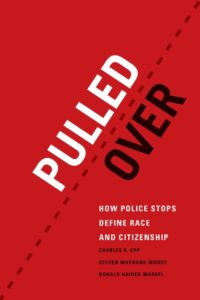
Today’s papers brought forth two news items that I found fascinating. The first, Heather Knight’s piece in today’s Chronicle, reports of San Francisco D.A. Chesa Boudin’s effort to reach out to crime victims and ask about their priorities for his office. The victims in the article were presented with a preselected menu of five priorities to rank by importance: prioritizing rehabilitation over punishment, providing restorative justice options for victims of crime, increasing alternatives to prison, increasing services for victims of crime, and increasing financial resources for victims of crime.
The victims Knight interviewed were frustrated by the survey, which yielded a very low response rate. One of them said: “There was no option to disagree or to even add a suggestion or comment to what could be included in those five very limited options. . . It’s disappointing and disrespectful to survivors.” Others expressed dismay over the fact that the survey seemed like an effort to distort their perspectives to support approaches such as restorative justice, which they thought “may work for petty thieves, but not for violent criminals.”
The other item was a stunning editorial in the L.A. Times, authored by Polly Klaas’ two sisters, Annie and Jess Nichol, in opposition to Prop. 20. This is especially striking because of the contrast to Polly’s father Mark, who became the face of punitive legislation in California. Mark was the force behind the Three Strikes Law and continued advocating against its amendment in 2012 and against Prop. 57 in 2016.
Annie and Jess don’t seem to share their father’s politics. They write that mandatory minimums, and other punitive laws “were strongly supported by people across the political spectrum and by a prominent voice in our own family. The best known of the mandatory sentencing enhancement laws came to be known as ‘three strikes,’ which aimed to keep people in prison for life after a third conviction for a serious offense.” They continue:
Ostensibly, these laws were meant to prevent tragedies like our sister’s murder from being repeated. Yet many of the people who ended up with life sentences under three-strikes laws were convicted of nonviolent crimes — things such as stealing a bicycle, attempting to forge a check, breaking a church window or using drugs. The laws produced a misguided sentencing system benefiting the prison industry, whose survival depends on large numbers of incarcerated people serving extended sentences.
People imprisoned under three-strikes and other mandatory sentencing laws are overwhelmingly Black and Latino, and they are also often mentally ill or homeless. Over the last 26 years, three-strikes laws have significantly contributed to mass incarceration in the United States and have exacerbated the systemic racism inherent in our justice system.
Up until now, we have been reluctant to insert ourselves into the conversation around criminal justiceout of respect fordiffering perspectives in our own extended family. Polly’s dad worked hard to see that stricter sentencing laws were passed after her death. We love and respect him, and it’s been painful to disagree about something that’s so personal for all of us.
But this is a pivotal moment in the history of our country. This summer, millions of brave Americans have taken to the streets to protest the racism and systemic injustices plaguing our country. Their courage has inspired us to speak out, to join the movement to transform our criminal justice system and build a better legacy for our sister.
As much as those who benefit from prisons want you to believe that mass incarceration makes us safer, the data tell a different story. Decades of research show that the harsh and violent prison environment is deeply damaging and sets people up to fail when they reenter society. On the other hand, rehabilitation — providing skills, services and treatment to incarcerated people — can drastically reduce recidivism rates. Legislators have mostly ignored this fact, claiming that tough-on-crime legislation is universally what crime victims want, but an Alliance for Justice survey found that victims of crime and their loved ones — like us — are twice as likely to favor rehabilitative programming and alternatives to incarceration. Clearly, incarcerating our way to safety doesn’t work.
Thankfully, three-strikes and other extreme sentencing laws have undergone some progressive reforms in the last decade to expand rehabilitation, but an initiative on California’s November ballot called Proposition 20 aims to reverse much of that progress. Proposition 20 is an attempt by the prison industry and its allies to yet again weaponize our fear to expand their profits and their prisons.
Like many other victim advocates, we believe that the resources spent on mass incarceration should be used to reinvest in underserved communities for prevention programs. By providing support, job training and rehabilitative services, we can prevent crime at the local level, help formerly incarcerated people successfully reintegrate into society and make our communities safer.
Proposition 20 would move criminal justice in California backwards. As Polly’s sisters, we strongly support systemic interventions that actually work to lift up our communities and keep people safe.
What to make of the juxtaposition of these two items? If nothing else, that crime victims–like everyone else–are a diverse group of people with a range of opinions about their personal experiences and about the policy implications of these experiences. There’s a great 1999 article by Kent Roach titled Four Models of the Criminal Process in which he has not one, but two victim models–a punitive one, which is basically what we’ve had here for decades, and the nonpunitive one, which looks a lot like restorative justice/family circles.
What I see in these new representations of victimization (and let’s not forget to throw in there the backlash against Brandt Jean’s forgiveness and against Christian Cooper’s broadmindedness because, I don’t know, they went through awful experiences and so they owe you something) is an idea I discussed a lot in Yesterday’s Monsters and elsewhere: In this society that won’t offer a quiet, empathetic, nonjudgmental ear to people or care about them unless they perform a spectacle of suffering, your victimization, rather than entitle you to compassion and practical assistance, imbues you with mystical power and moral authority. It matters very much what we call you (victim? survivor?) and it also matters very much what you think about criminal justice, and so people on both sides try to make your feelings about what happened to you into an object lesson. Punitive entrepreneurs rope your feelings, real or hypothetical, into areas that might be completely removed from your consciousness (breathtakingly, Prop. 17 opponents imply in their arguments not only that victims’ feelings about the right to vote for parolees should matter, but that victims even have such feelings at all), and nonpunitive entrepreneurs try to contort your answers to a survey to support a restorative justice agenda.
Of course, this is not all a manipulation done on unwilling victims. California offers plenty of examples who marshaled the horrific tragedies in their families into a career in punitive advocacy, like Dominick Dunne, the Tate family, and Mr. Klaas. But would people feel compelled to take on moral crusades if they were allowed to feel their feelings, be they punitive, restorative, or anything in between, without the additional responsibility of being the state curators of criminal justice policy? What if someone’s feelings about a horrible experience they went through–whatever these might be–were listened to with compassion and care, and they were just their feelings–no more and no less–and were not imbued with a magical ability to sway criminal justice to and fro? Can we maybe hold a bit less tightly the fashionable notion, which permeates all criminal justice discourse, on the left and on the right, that people’s lived experiences are the policymaking gospel, and that expertise, budgeting, prediction, and project evaluation are somehow heartless and evil? Can we give feelings a space to just be what they are–feelings–without forcing them to be something else?




No comment yet, add your voice below!